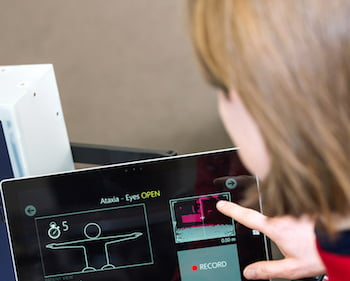Microsoft is working with Novartis on a Kinect-based multiple sclerosis (MS) assessment tool. The partnership started a few years ago to create a system, called Assess MS, that would be better than existing tools, while also enabling patients to perform these tests from their homes.
The current MS tests require patients to perform movements, like touching their nose or sitting with their arms outstretched, which are then rated by physicians. The problem is that these ratings are somewhat subjective, and could thus vary from physician to physician, or patient to patient. With Kinect-based system, this process could be semi-automated while also giving each test a dose of objectivity. Also, it is not meant to replace the physician, but provide them with accurate data that they can incorporate into their diagnosis.
“The clinicians that we worked with really care about their patients,” Abigail Sellen, a principal researcher in the Human Experience and Design group at Microsoft, said in a statement. “They really want what’s best for them, and even the best neurologist will admit that when they use these rating scales, it’s pretty coarse-grained. They know that there’s a lot of variability, even in their own judgments, over time.”
The two companies are developing algorithms that will pick up on subtle movements a patient makes, like when his/her torso sways, and label the data consistently. Researchers have also altered the system so that it would fit in an exam room by adding wheels to the setup so that the device can move around. Additionally, unlike the regular Kinect camera, this custom version has a screen of its own that provides patients with an animation that demonstrates movements.
If Assess MS proves to be working, Novartis hopes to use it to speed up clinical trials on MS, as well as expand its use to similar diseases.
Meanwhile, we’ve seen two other pharma companies using modern tools to study MS: in January 2015, Biogen Idec partnered with Google to study outside factors that might contribute to the progression of MS; and later that year, PatientsLikeMe unveiled results of an MS wearable study conducted in collaboration with Biogen.
[Via: mobihealthnews]


